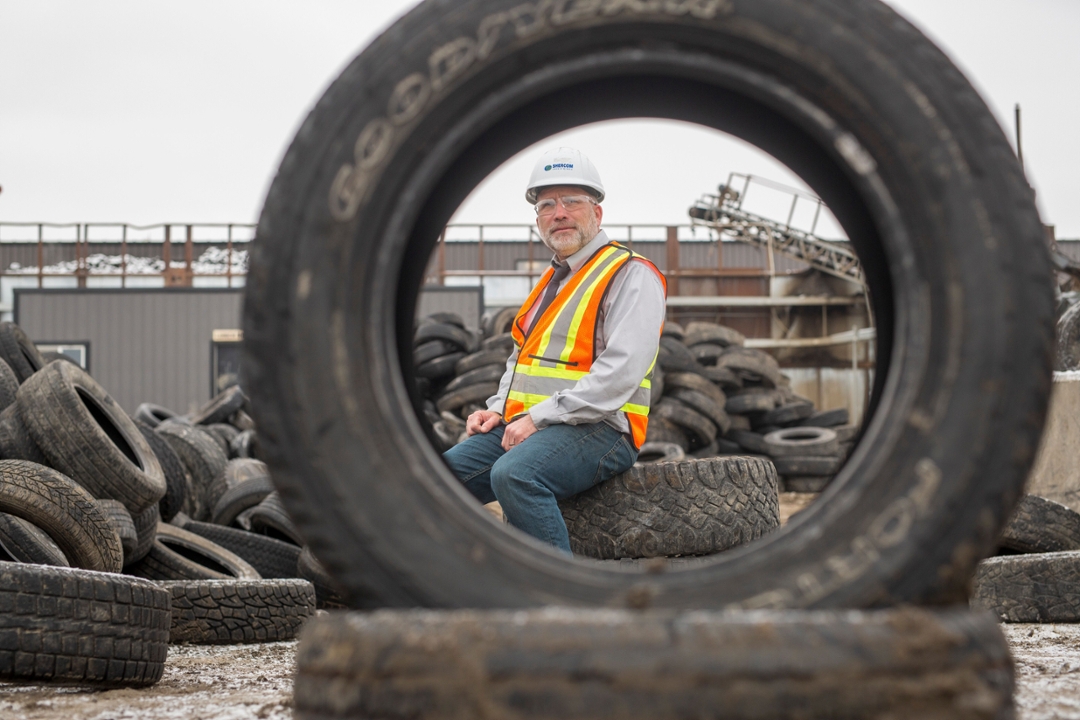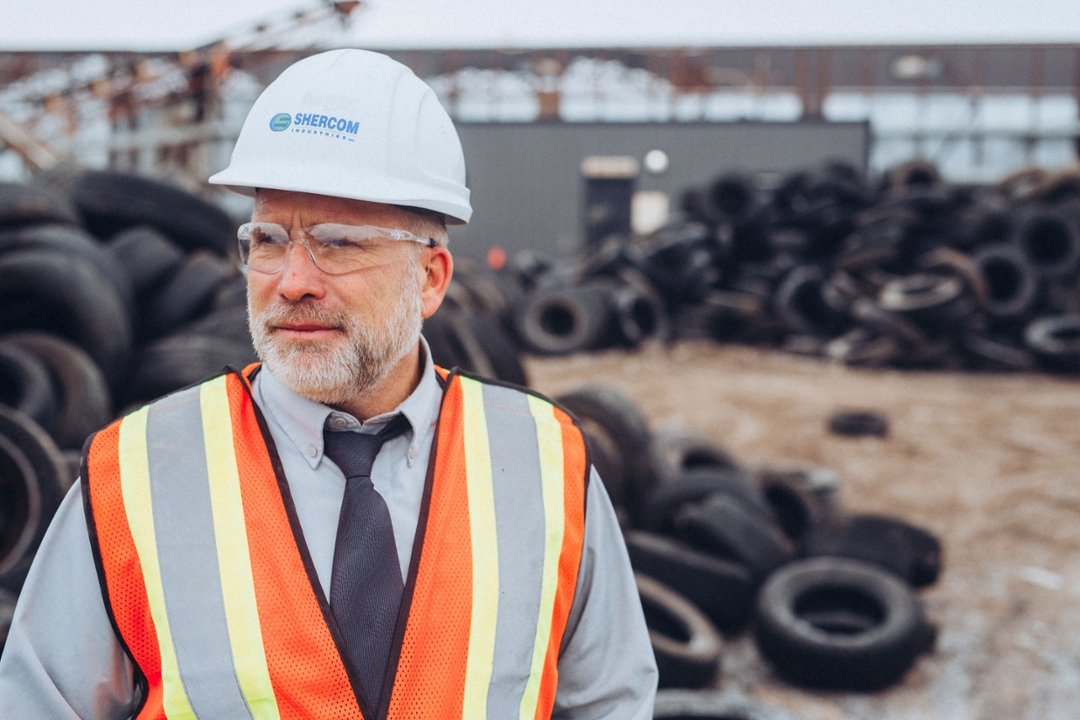
Black is the new green
Shane Olson pioneered rubber recycling 26 years ago while working nights to feed his family. Today, his company is working with Nike.
By Joanne Paulson (BA’82)Shane Olson (BSA’93) clearly saw it coming.
When he founded Shercom Industries Inc. with a cousin in the same year of his USask graduation, Olson was ahead of the curve, recycling rubber before Saskatchewan had an environmental levy on tires.
That came five years later, leaving Shercom to manufacture parking curbs and lawn edgings from ‘buffing’ — a byproduct of the new treads used on semi-trailer tires.
The early days were not easy. There was no appropriate technology, equipment, nor even a large stream of raw material. Olson built Shercom during the day and worked as a welder at night to support his family.
It was a slog. Olson put one foot in front of the other, day after day. Today, you could say there’s a “Swoosh” in his step.
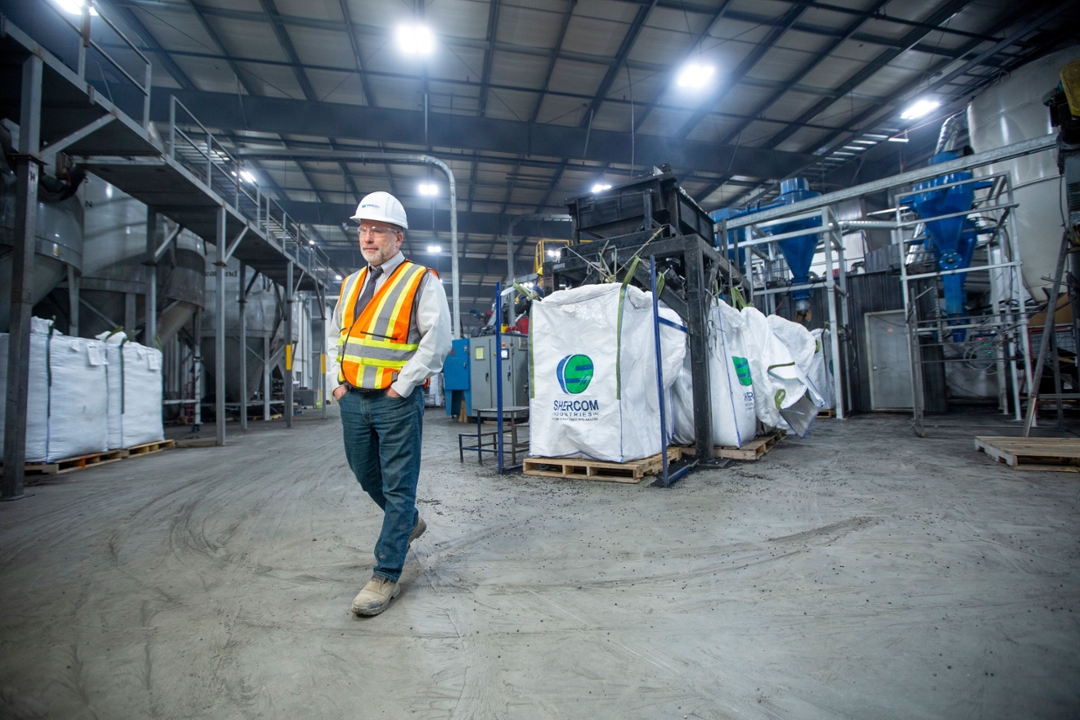
While climate change has overtaken political and social conversations, Olson has built on his vision for 26 years. Now, his company recycles more than a million pounds of tires every week, and of the 49.8 million pounds Shercom brought in last year, “not one pound went to the landfill,” he said.
The once-little company of two has grown to 110 employees, a large spread of land and buildings near Martensville, Sask., and 80 to 100 product “SKUs” at any given time. In the last two years, Shercom’s business has grown 30 per cent annually.
Back to the Swoosh. Among the most exciting new developments is a contract with Nike Canada to recycle rubber shoe soles. He’s also in negotiations on a second contract with a major retailer.
Yet, when you catch up to Olson and ask him about Shercom’s history, you’re likely to hear his views on recycling and sustainability before he even mentions the company’s products and achievements.
“There’s this understanding that in order to do the right thing, it comes at an additional cost, or an inconvenience, or both,” said Olson. “That’s very detrimental to the directive of what needs to be done. In order for recycling to become mainstream, it has to be sustainable.
“This narrative that doing the right thing comes at a cost, and or at an inconvenience, is quite predominant. But that’s not our message. Our message is that recycling is the right thing to do, and in order for us to be sustainable, and for recycling to be sustainable, we have to provide the same or better product for the same or better price.”
He imbues his marketing and community support with that message. For example, in the last two years, Shercom has been running a Tire Neutral campaign with the slogan “Black is the new green.”
Every person in the province generates one scrap tire per year, he explains. And Saskatchewan generates more per capita than other jurisdictions because of its many miles of road and resource-based industries, requiring the hauling of oil, natural gas, grain, fertilizer, hay, cattle and other livestock.
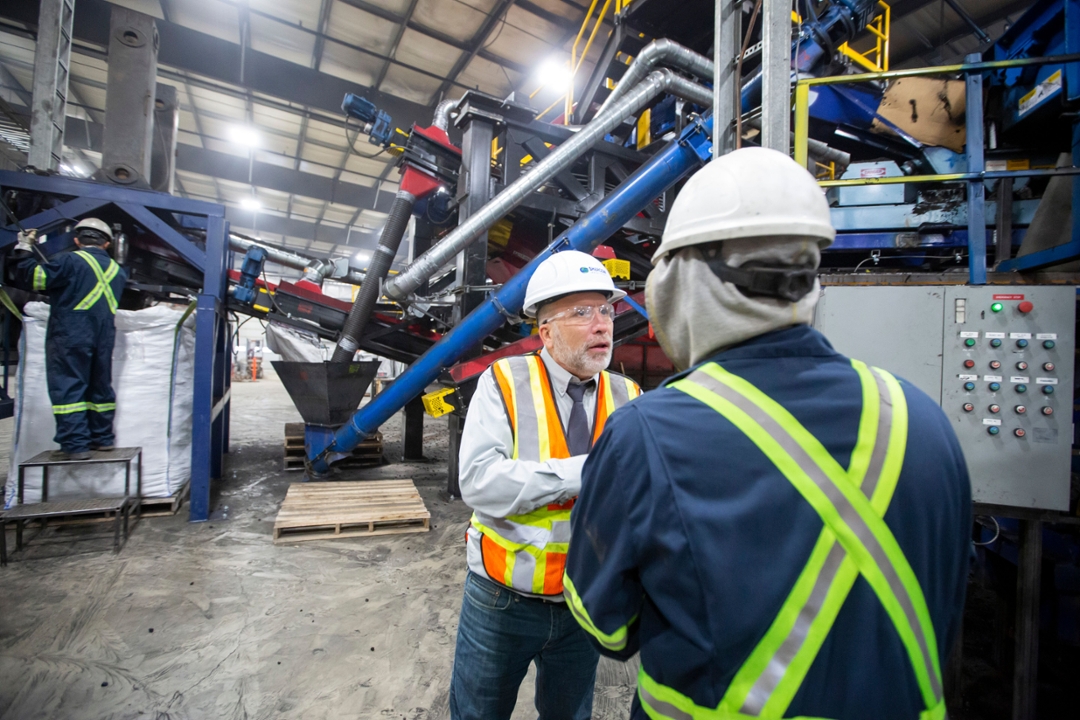
If a person, business or community purchases products made from that recycled rubber, he or she can become “tire neutral.”
“We get about five pounds of steel out of the tire, 14 pounds of rubber and one pound of nylon. That patio tile recycles one tire,” Olson said.
“If you need a 10x10 patio, that’s 25 tiles — much more than the one tire ascribed to an individual per year.
“You as an individual will be tire neutral for the next 25 years. That is a significant contribution. That is something that individual can be proud of and say hey, I did my part. And they got a cost-effective product on money that they were going to spend anyway. That’s just one example.”
Communities as well as individuals can be tire neutral, he points out. Vanscoy, Sask. recently built a playground made of recycled rubber with a contribution from the Shercom Cares program. Olson’s manager went out to the opening and told Vanscoy the entire community was tire neutral for the next several years.
“What I was encouraged about is that the people applauded and cheered,” Olson said.
The majority of Shercom’s goods are exported outside Saskatchewan, which is not uncommon for Saskatchewan-based manufacturers, “but I truly believe that there is enough market here that Saskatchewan can be tire neutral,” he added.
Which brings him back to Nike. Shercom has an exclusive contract for Nike Grind, the post-industrial shoe sole scraps and “Reuse-a-Shoe” recycled soles, for all of Canada. The grind goes into rubber paving products, and “it’s created a better, more exciting product because it’s a colourful application,” Olson said.
Olson turns the conversation over to Mike Richards, director of rubber surfaces, to explain the program, because it’s largely his “baby.”
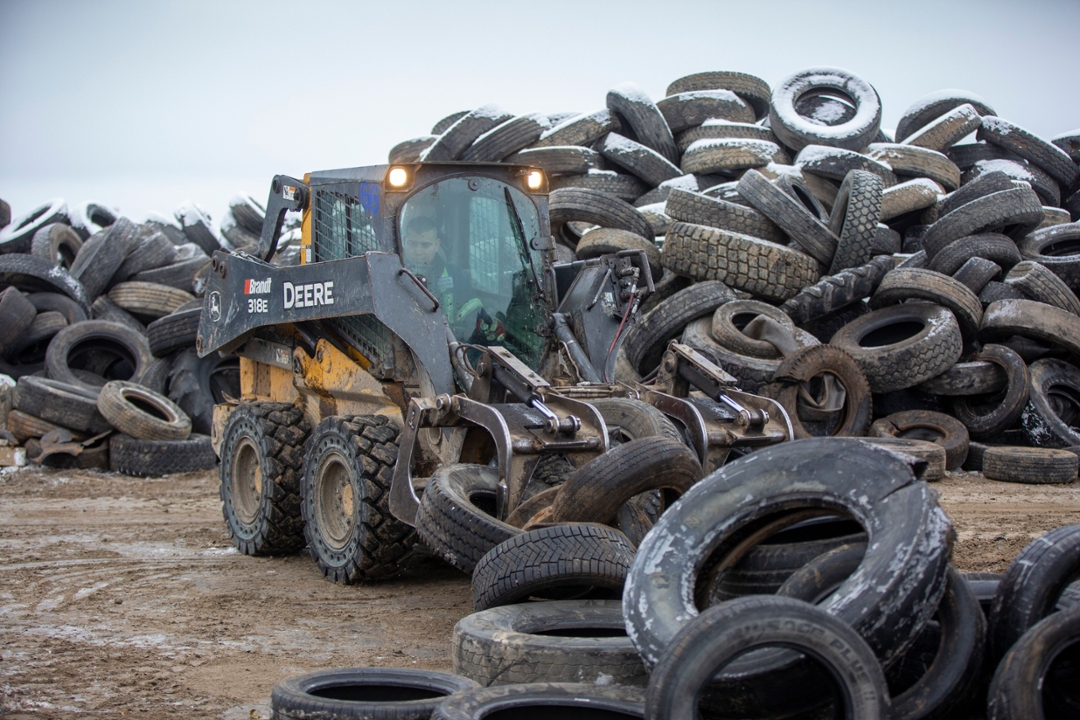
“We signed a contract with Playtop (an international playground surfacing company) and through them, with Nike, we are the exclusive installer of the Nike Grind product in Canada. For us at Shercom, we do a lot of playgrounds, patios, pool decks,” Richards said.
The contract was signed in July, and the SHERPLAY surfaces are now offered through 26 Canadian locations; Shercom is working on connections with retailers in the United States, as well.
As Richards says, the surfaces are safer than concrete, asphalt, pea gravel or even sand; and they come in fun hues such as orange, purple and green.
“The minute somebody lands on the ground and changes the depth of that (sand) surface, it loses its capability to absorb the shock of that kid falling,” he said. “This is stable and it stays in place. Now we have a vibrant, cool surface instead of just a safe surface.”
Not all Shercom products are used above ground. Tire-derived aggregate, or TDA, is an alternative to gravel in road building and maintenance and is particularly useful in repairing frost-heaved or “frost boil” spots.
“The spaces between the bits of shred allow for drainage and is greater than the surface tension of water, which can then wick to the surface. Rubber is also a good insulator, and if you put a 12-inch layer of shred below the road surface it prevents the frost from penetrating,” Olson says.
Shercom sells TDA for $10 per cubic metre, while crushed rock goes for $30 to $40; one cubic metre of TDA recycles 50 tires.
He has also created two consumer benefit programs to help build recycling awareness. One is the EnviroBuck, which can be used by consumers to recoup their environmental levy on a purchase of any Shercom product. For tire dealers, the company offers a point for each recycled tire; the businesses can then redeem the points for products or donate them to their communities.
Products also include stackwalls for landscaping, ramps, and a myriad of other items.
“I think we’re just beginning to develop a lot of the markets. It’s really about creating the awareness,” Olson said.
He hopes his message may someday be heard across Canada, and perhaps beyond: Fundamentally, that the “perpetual wheel” of the recycling economy — repurposing used tires into quality products — be accepted by consumers.
“You are doing the right thing, it didn’t cost more, and it wasn’t an inconvenience.”
It’s something Olson could see all those years ago.
